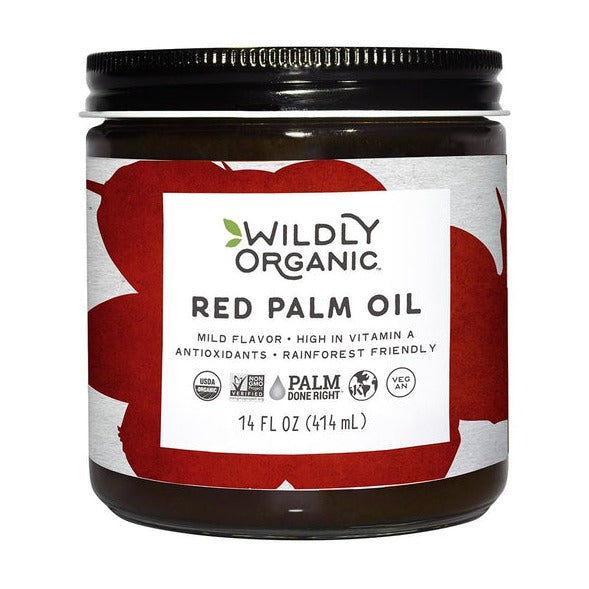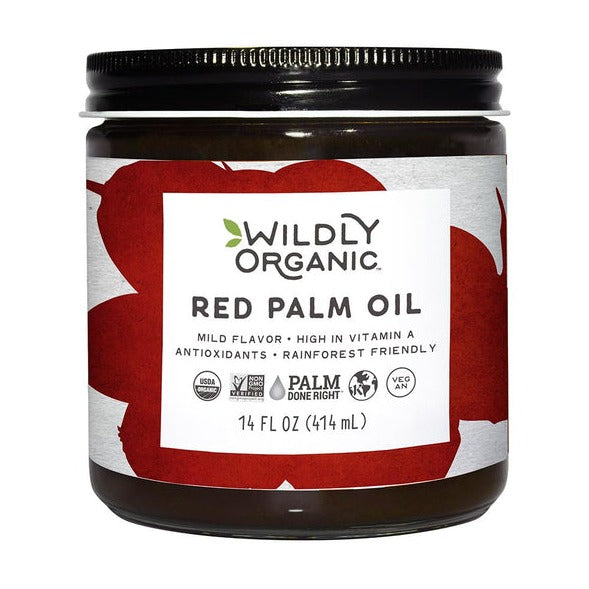New Roots
Red Palm Oil
Red Palm Oil
Couldn't load pickup availability
Our red palm oil is a one-of-a-kind product made by special order for us from an eco-friendly processor in Ecuador with sustainable agricultural practices. This oil contains high levels of fat-soluble antioxidants: beta-carotene (vitamin A), and tocopherols and tocotrienols (vitamin E). With a remarkable neutral flavor and a dark red-orange color, our red palm oil stands out both in quality and nutritional value.
Organic Red Palm Oil is a Traditional Food
For thousands of years, most of the food eaten by the human race, whether raw or cooked, came from natural, unprocessed foods. Nuts and seeds were oftentimes freshly pressed for use as oil. In Mediterranean countries, the pulp of the olive was used to make prized oil long before the Common Era. For centuries, just like the olive tree, special palm trees in tropical, rainy climates supplied precious, deep red-orange oil from the pulp of their fruit. We call this red palm oil.
Natural red palm oil is produced from the fruit of the red palm, Elaeis guineensis. This palm tree can be found in the wet, rainy areas of Africa and tropical rain forests of Asia and South America. Our red palm oil comes from Ecuador, where there is no threat of harming orangutan habitats—a prevalent concern with producing palm oil products. Wildly Organic’s Red Palm Oil is RSPO certified by the producer we purchase from, which also happens to be a founding member of this organization. Our red palm oil is also non-GMO certified, fair-trade certified, part of the Palm Done Right Campaign, kosher, vegan, and keto-friendly.
How Does Red Palm Oil Compare to Other Oils (Such as Olive Oil, Coconut Oil, Soybean Oil, Etc.)?
Red palm oil contains more beta-carotene (Vitamin A) and tocopherols and tocotrienols (Vitamin E) than any other oil. Remains stable when used for cooking. It is not hydrogenated, nor processed with solvents such as hexane, and does not contain any trans-fatty acids.
How is Natural Red Palm Oil Different from Other Palm Oil (and Why Are They Not Red)?
There are very few natural, unrefined, great-tasting red palm oils available in America. Most palm oil in America has been refined, bleached, deodorized, and does not exhibit any color. This is because during the refining process they remove all substances (other than the fatty acids) from the oil resulting in purified oil similar to many of the other refined oils currently in the standard American diet. Soybean oil, corn oil, safflower oil, and canola oil are all refined oils found in grocery stores throughout America today. Unfortunately, this means all those carotenoids, tocopherols and tocotrienols are removed by the refining process. However, red palm oil preserves those fat-soluble vitamins, as seen through its deep reddish-orange color, and has a pleasant, neutral taste.
How Our Red Palm Oil is made
Our producer works with more than 129 small farmers and 150 small farms in Ecuador, helping them to convert from conventional to organic farms. Farmers handpick red palm fruit and transport them by donkey-drawn cart to be pressed at a mill. They are steamed to 200ºF to release the oil before being cold-expeller pressed. In working with the Palm Done Right Campaign, our producer’s farms in the Ecuadorian jungle have no clear-cutting, burning, or planting in the primal forest; rather, they organically grow palms on degraded land next to complementary crops and uncultured land, which promotes biodiversity. Our red palm oil is FairTrade certified, and our producer helps the farmers’ communities by building and staffing clinics, supporting local schools, developing sports programs for local kids, and conducting educational sessions on proper recycling and waste management.
Our red palm oil has a high smoke point of 350F, making it a more stable oil for cooking and sautéing.
What Does the RSPO Certification Mean?
The journey of the Roundtable on Sustainable Palm Oil (RSPO) started in 2003 as an informal co-operation among top palm oil producers. In 2004, RSPO was legally registered in Switzerland as a nonprofit organization and set up offices in Kuala Lumpur (Malaysia) and Jakarta (Indonesia). Today the RSPO principles, criteria and indicators extend far beyond just conserving the primary rainforest. They require a comprehensive, independent social and environmental impact assessment, which includes soil types and other high conservation values important for sustaining biodiversity.


